Bagoyang-goyang
Today’s post was written by Brenton Pham. He is currently doing his service portion in Kupang on the island of Timor.
It just so happened that, in the first week of service, the University Nusa Cendana in Kupang would be hosting one of their graduation ceremonies on Wednesday (2/28). They were celebrating the successful college careers of ~2,000 students and Johanna and I were invited to attend. The event was impressive and very interesting, but the real story comes from later that night. It turned out that one of the 2,000 were related to my host family and would be holding a graduation party. So at around 9:00pm, my host mom, my two host brothers, and I left for my first social gathering since being in Kupang. Driving through the night and weaving through tight neighborhood roads, I imagined what the party would look like. My only experiences of Indonesian events came from those I attended during study in Yogyakarta. There, the celebrations were large and extremely organized with a set schedule and key speakers. There were snacks and conversation, but the focus was still centered around a main event. I pictured a similar scenario here, but I was not sure because Kupang is significantly smaller than Yogya and the invitees would be more intimately acquainted.
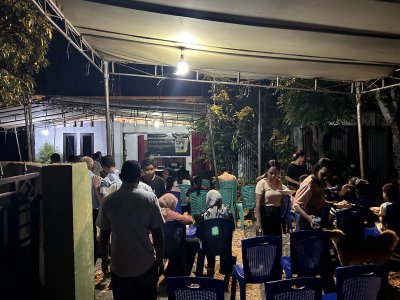
My expectations were proven wrong. When we finally arrived, we were greeted by an unassuming set up in the frontyard of a house. There were rows and rows of plastic blue chairs facing the front of house, tents of tarp overhanging the space, around 50 people already situated and chatting with plates of food, and even more people forming a line through the seats and into the house for said food. It felt more akin to a backyard barbecue than the grand celebration that I had envisioned – which was both reassuring and intimidating at the same time. Reassuring in that fact that it was a more relaxed environment, but intimidating because everyone was already intimately acquainted.
My host mom immediately took me by the arm and pulled me into the house to grab a plate of food.
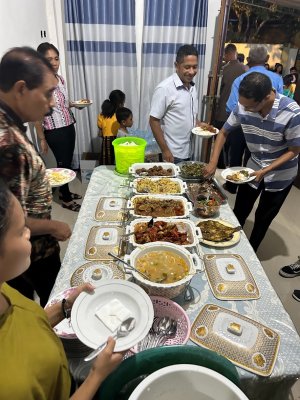
After filling up my dish to the brim (I was pretty hungry) my mom ushered me to a seat next to a group of women she proceeded to jump straight into conversation with. Everyone seemed engrossed in talking and I did not feel very confident in the moment to try and spark up conversation, so I just focused on eating and observing the venue. There was a large vinyl banner in front of me with the picture of the graduate, under that was a large speaker playing Indonesian music into the crowd, and in front of both was the graduate herself taking pictures with family. At some point in the festivities, when everyone seemed finished eating, my host mom began clearing chairs from the front of house and said to me, and I quote, “Mama mau(want to) dance!” She placed herself front and center and began stepping to the upbeat, electronic music. Her actions seemed to spark a chain reaction and even more women got up to join them – all moving in sync to the music as if they were a dance troupe. I would later learn that this type of dancing is called “bagoyang” which roughly translates to shaking. It is a less formal form of dance as compared to “tari” which is the type of traditional dance that one would study in order to perform. Bagoyang is similar to the line dancing we do in the US except it is much more feet focused, more diverse in songs, and the music does not walk you through the steps (i.e. slide to the left, slide to the right, criss cross). It is an important aspect of Kupang party culture and it seems everyone is born with all the steps memorized. As mentioned before, I was feeling nervous about talking to people, but I did not want to spend the whole party isolated by myself, so I got up and joined the dancing mothers. To preface, I do not dance. I would not call myself a good dancer by any means, but something about the environment made me want to try. I watched intently at my mom’s feet (which were moving so naturally) and copied with my own.
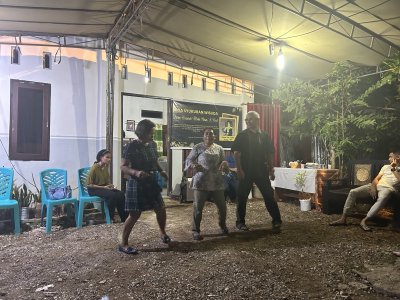
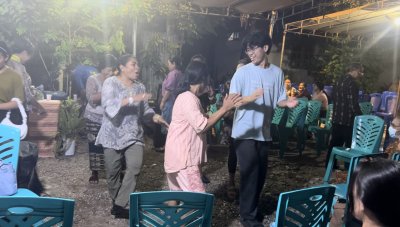
Halfway through, I got a hang of the steps and everyone clapped and laughed along with us as we continued to dance. We went for five or six more songs – each with different moves by the way – and more and more people joined each time. After feeling tired and sweaty, I sat down and, to my surprise, many party goers approached me and started some small talk. They were approaching me! I introduced myself, explained why I’m in Indonesia, where my parents are from, shared my first impressions of Kupang, and asked some of the same questions in return. The party suddenly seemed to open up and I was feeling much more energized to converse because they wanted to talk to me! I feel that this was only possible because I jumped into the bagoyang and demonstrated that I wanted to actively participate in their culture – this leads to my main takeaway from this experience.
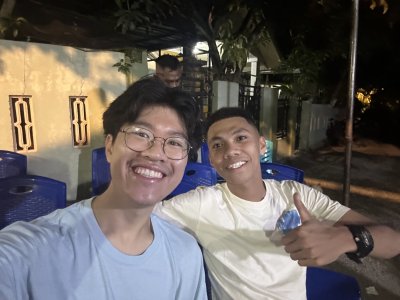
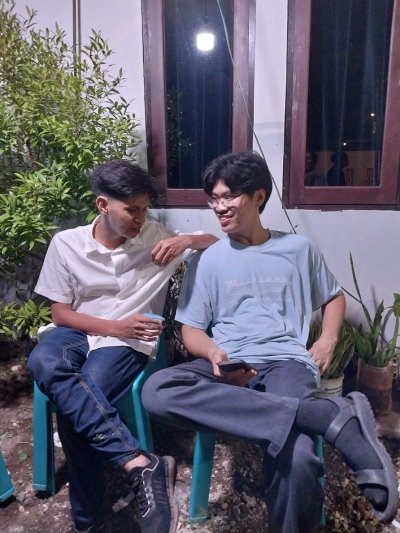
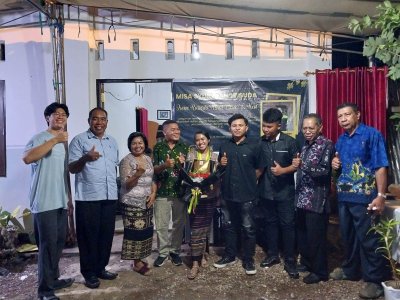
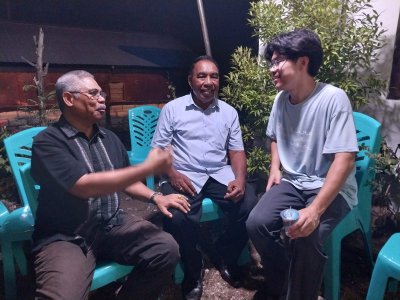
We, as SST students, co-exist within the culture and homes of others. It is easy to turn inwards and sink in the culture shock, language barrier, and lack of normality – and there are definitely days that bring us down. However, there are also countless enriching experiences that are only available in this context; they open up exponentially if we show that we’re interested in receiving them. For me, I closed myself off at the beginning of this party by not initiating conversation, but was still able to immerse myself in other ways besides language. As a result, I now have a good story to tell and I feel that I have grown closer with my host family. Even though I felt timid at the time, I can say now that I am happy to have gone out of my comfort zone and bagoyang with everyone. I hope I’ll have more chances to bagoyang during the rest of my time here!




